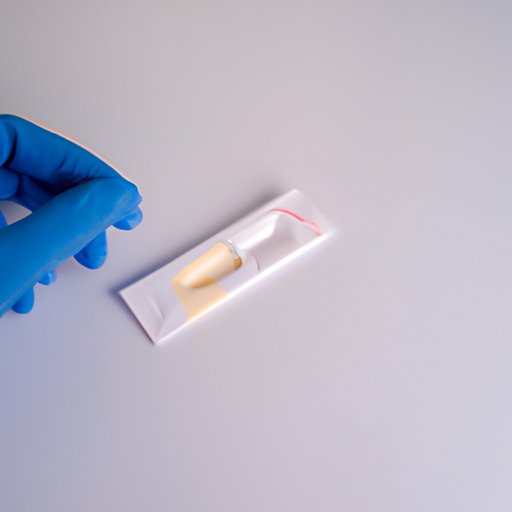
Introduction
Herpes is a viral infection that spreads through sexual contact or skin-to-skin contact with an infected person. Herpes testing is crucial because it helps to detect the virus and manage the condition. This article aims to provide a comprehensive guide on how to test for herpes, including different types of tests, preparation needed, and the importance of early testing.
What You Need to Know about Herpes Testing
There are three types of herpes tests available: blood tests, swab tests, and polymerase chain reaction (PCR) tests. Blood tests check for the presence of antibodies that fight the virus, while swab tests take a sample from the infected area for testing. PCR tests are used to identify the genetic material of the virus in the sample.
Preparing for a herpes test involves refraining from sexual activity for at least 24 hours before the test. Additionally, patients should avoid using any creams, ointments, or medication on the affected area for at least two hours before a swab test.
Can You Test for Herpes at Home? Here’s What You Need to Know
At-home herpes testing kits are becoming more common. These kits provide convenience and privacy for those who may feel uncomfortable visiting a clinic. However, there are pros and cons to consider before using an at-home kit.
The benefits of at-home kits include convenience, privacy, and ease of use. The drawbacks include the possibility of inaccurate results and the inability to receive counseling or treatment. If you decide to use an at-home testing kit, ensure that it is FDA-approved and follow the instructions carefully to avoid obtaining inaccurate results.
The Importance of Early Herpes Testing
Early herpes testing is crucial because it allows for prompt treatment and management. Detecting the virus early can reduce the risk of long-term complications and the spread of the infection to others. It is recommended to get tested for herpes if you are sexually active, have multiple sexual partners, or have symptoms like blisters, sores, or itching in the genital area.
Testing services are available at clinics, community health centers, or online. You can contact your doctor or a local testing center for more information. It is essential to remember that herpes is a manageable condition and early testing is the first step towards reducing the impact of the virus.
What Happens After a Positive Herpes Test: Understanding Treatment and Management
Management of herpes after a positive test involves medication to manage outbreaks and reduce the transmission of the virus. Treatment options include antiviral medication that can shorten the duration and severity of symptoms. Additionally, lifestyle adjustments like stress management, diet, and exercise can help reduce the frequency and severity of outbreaks.
Reducing the risk of transmission involves practicing safe sex by using condoms and avoiding sexual contact during outbreaks. It is also essential to inform sexual partners about the condition and discuss ways to manage and reduce the risk of transmission.
Talking to Your Partner About Herpes Testing
It can be challenging to talk to your partner about herpes testing, especially if you have recently tested positive. However, open communication is crucial for the management and prevention of the virus’s spread.
When talking to your partner about herpes testing, remember to be honest, respectful, and non-judgmental. Ensure that you provide adequate information about the virus and its management to reduce fear and stigmatization. Testing together can also help foster trust and intimacy in the relationship.
Understanding False-Positive Herpes Test Results
False-positive herpes test results can occur due to inaccurate testing methods or cross-reactivity with other viruses. To avoid false-positive results, it is essential to use validated testing methods and seek counseling from a healthcare professional.
If you receive a false-positive herpes test result, do not panic. Seek further testing and counseling to confirm the result and develop an appropriate management plan. It is crucial to remember that anyone can contract herpes, and it is not a reflection of one’s moral character.
Conclusion
Herpes is a manageable condition, and timely testing is crucial for the management and prevention of the virus’s spread. Different testing methods are available, including blood tests, swab tests, and PCR tests, and at-home testing kits are becoming more popular.
Early testing allows for prompt treatment and management, and managing the condition involves medication, lifestyle adjustments, and safe sex practices. Open communication with sexual partners is essential, and counseling and testing services are available to help guide those affected by the virus.
Understanding the importance of herpes testing and management can reduce the fear and stigma associated with the condition. It is a manageable condition, and seeking timely testing and treatment is the first step towards reducing its impact.





